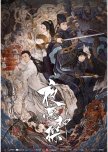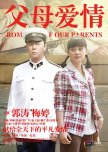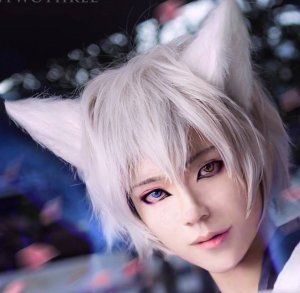
Ultra Slow Burn, Amazing Chemistry
This is going to be my shortest review ever! Love Like the Galaxy is one of the better Chinese dramas released so far this year. It is serious and yet so comedic. The acting is spot on though Wu Lei may look a bit stiff when he walks as he tries to look grandiose, but I can overlook this flaw because I love his character so much and Wu Lei looks great. His subtle emotions are convincingly done as he's supposed to be a stoic person. Zhao Lusi is simply amazing here and her character is so lovable and relatable. Overall, a drama well-done and deserves a TWO THUMBS UP!BRAVO!
Was this review helpful to you?

Hair Pulling Script
Though not overly exciting, I have sort of enjoyed the first half of the story (season 1) because there is nothing out there to watch. I thought the second half would more or less be the same, continue from the first half. To my disappointment, the writing gets really bad and childish, though the storyline continues. Throughout, I have been suppressing myself from hurling pillows at my computer. And I’m glad it’s over.From season 1, we have established that Jun Wujiu (Li Xizi) is a genius investigator, and he works seamlessly with Cheng Yang (Chen Ziyou), who wears many hats (he is a police officer cum prosecutor cum magistrate - what a conflict of interest here), in solving criminal cases after cases. What seemingly unrelated, in fact all these cases are associated with each other and ultimately, pointing to a couple of villains who are behind all the killings in broad daylight. When the dots are connected, it is not difficult for the team to find evidence to put the villains away, and that’s the boring and frustrating part because of the bad writing. Though the villains are blatant and out in the open, the protagonists become very stupid and do all the dumb things that even a 3-year old wouldn’t do (well, maybe I exaggerated, but you get what I mean). The dialogues become kiddie with a bunch of noise and no substance. The timeline is all messed up (when it’s broad daylight, the dialogues refer to midnight etc.) causing eye-rolls constantly. Glaring flaws and plot holes run every minute. From episode 8 onwards, every episode is a torture – I feel like vomiting blood.
My Verdict
This is a very disappointing drama. There’s no character development, no plot build-up, no epiphany, and no planning because the protagonists are always reactionary. If you are looking for romance, there’s none either (I don’t care so much about romance here). Not one character stands out that makes viewers love and remember. The male lead character, Cheng Yang, is not very impressive though the actor looks very nice in his uniform. Perhaps that’s the only thing I like the most – beautiful constable uniform (call me skin deep).
Was this review helpful to you?

Devoted Emperor - An Extinct Species
I have really enjoyed this short series despite many viewers claim the story being unoriginal with an expected outcome. This is an Isekai story whereby the female lead is transported to a parallel universe in the ancient times through virtual gaming. The story may not be original for many viewers, but I still find it sweet and relaxing.I love the performances of the two main leads Li Xia (Camille Hua) and Emperor Yang Mo (Alan Luo), Though this is my first time watching their drama, I find them authentic and lovable, and the couple has great dynamics together. Apart from their good look, I really enjoy the story of an emperor who truly loves a woman and is devoted to her even when she is of a low social status and not attractive; I like watching the emperor for valuing a person from the inside rather than from the outside. It's nice to imagine that somewhere out there, such characters do exist. Alan Luo has successfully portrayed his longing for Li Xia even when their relationship is prohibited. It is interesting to watch Li Xia managing an historical character with contemporary etiquettes and Camille Hua plays the role beautifully with her beautiful sweet smile.
I also love the side couple here, Jie Qing Shu (Joseph Wen) and Fan Ru Wiang (Li Hai Shan). Both generals, Jie Qing Shu is serious, quiet and calculative but Fan Ru Wiang is totally the opposite of him. Being outspoken, rash and impatient, Fan Ru Wiang always takes the lead towards Jie Qing Shu. Their dynamics are sweet and warm.
I like the narrative at the end of each episode. It reflects the thoughts of the writer, what the journey brings to him/her, and the lessons learned. The narratives are philosophical and provide deeper searches within the viewers' hearts.
The only issue I have is how the story does not even attempt to reconcile the sudden come and go of Li Xia. There is a lot of unanswered questions for the Emperor and the Generals (and people around them) regarding Li Xia, but these are not explained to them convincingly and they simply accept Li Xia as if she is normal like them. I guess, these are just characters from a video game that don't need to make sense of anything.
The low rating here (7.2 at this moment) is not justifiable and should not be taken seriously as it is only rated by very few viewers, hence does not represent the true value of the drama. This is a short and light romance drama that may bring good entertainment value to the viewers. Worth a try.
Was this review helpful to you?

Lovely Couple but Poor Editing
This is supposedly a very interesting and light-hearted drama. The plot is intriguing and the cast is fabulous, especially the two female leads Bai Lu and Xiao Yan. The romance between the major characters, Lu Zhao Yao and Li Chen Lan is simply adorable and sweet. I love the main theme song so much – the verses are meaningful and the tune is beautiful. But that’s all the positives I can say about this drama.Inconsistencies and holes are everywhere. There were “dead” and “undead” people. The cutting and editing are particularly bad; it’s simply confusing. There are various so-called versions of the drama, but in essence, the contents of each episode are the same, except, perhaps one version has a prologue and the other has a preview at the ending. Having said that, episodes 19 and 21, followed by the last 4 episodes, are utterly confusing unless one finds the better cut version.
The initial pace and flow were not great but acceptable. It can be draggy at times. People talk super slowly, walk super slowly. All their motion is super slow. I feel I age 10 years after watching this drama. But the final few episodes were a torture, with a lot of time wasted on people looking at each other blankly. I found myself holding my breath, trying to endure till the end without screaming and pulling out my hair.
I initially enjoyed watching this drama so much because it was a panacea for me after watching the heart-wrenching “Goodbye My Princess” – a drama airing at the same time. This drama (The Legends) provided the little relief I needed as it was funny with a straight face and the characters are adorable.
I particularly enjoyed watching Xiao Yan playing 2 roles - one as a timid Qin Zhi Yan and the other as the badass Lu Zhao Yao; she portrayed the characters so well, switching in and out. I also love the romance between Lu Zhao Yao and Li Chen Lan. I love the feeling of having a man, standing right next to or behind me, quietly protecting me and doting on me all the time. He is powerful and yet not overwhelming. He is a lion facing his enemy, but only a small sweet kitty when he’s with me. With one thrust of his hand, he is able to send one into oblivion; or he can arrive at his destination in a whiff. I particularly love the line he told Lu Zhao Yao, “You fight, I’m your sword. You retreat, I’m your shield.” This line truly melts my heart.
I also love the character of a badass female, controlling the world, feared by all and yet admired and loved by all her followers. Bai Lu has played this character convincingly. She is beautiful and delightful.
Xu Kai has a very good-looking baby face. Having a timid and quiet persona, he portrays the Li Chen Lan’s character effortlessly and effectively. And yet, he is powerful and lethal at a click of the fingers. One always feels safe with him around.
The underlying theme for this drama is, good can be bad and bad can be good. What looks good on the surface can be rotten inside, and what’s bad about a person, can be a kind and upstanding one. Hence in this drama, you will see the supposedly good people touting they are doing the righteous things, are in fact the despicable characters, whereas the labelled son of demon, is in fact the most upstanding kind-hearted person of all.
Was this review helpful to you?

How to Catch a Seditionist
In "The Legend of Zhuohua," we follow the journeys of two determined women in a society that doesn't always favor them. Our main character, Mu Zhuohua (played by Jing Tian), studies hard, passes her exams and rises in the government. Another woman, Princess Rou Jia (played by Wang Likun), secretly aspires to become the Emperor. Both women dream of bringing positive changes and cleaning up corruption in the government.Their goals are similar, but they have different approaches. Mu Zhuohua wants an honest government and a stable monarchy. Meanwhile, Rou Jia gets consumed by revenge and a thirst for power, and she hides her true intentions behind a mask of philanthropy.
The story begins with Mu Zhuohua focused on her career, putting love and family on the backburner. Even though there's a deep connection between her and Liu Yan (played by Feng Shaofeng), they choose a unique path, deciding not to get married or have children. But as the story progresses, it shifts towards a full-blown romance, with Mu Zhuohua and Liu Yan growing closer. Unfortunately, Mu Zhuohua loses some of her initial spark as an ambitious woman striving for success. Nonetheless together, they crack the greatest conspiracy and catch the seditionist who is the mastermind of the whole thing.
It's said that the author was asked to change the storyline involving a female emperor. This shift causes Princess Rou Jia to end up as another negative character with a predictable ending, and perhaps the tone down has also weaken Mu Zhuohua's character.
In terms of acting, Wang Likun does an impressive job portraying Princess Rou Jia. Her transformation from grace and benevolence to calculated malevolence feels genuine and leaves a strong impression. Jing Tian's acting is decent, although it's a bit hard to picture her as the young and brilliant Mu Zhuohua due to her mature appearance. Feng Shaofeng's portrayal of Liu Yan, ailing but with a magnetic allure of a mature man in a deep voice with few words, is fine. However, the robotic voice dubbing is unbearable and distractive.
My Verdict
I initially liked the drama, but as it progressed, it became slow and filled with plot holes. The main lead characters seem to magically know the thoughts of their enemies. When they discover Princess Rou Jia's true nature, they show no surprise, which doesn't make much sense. The main female characters also become somewhat passive, and the male characters become rather banal.
My suggestion? Watch this drama while doing something else, like cooking or working out. It can be a background entertainment option!
Was this review helpful to you?

Earthling Versus Alien, Who Wins?
I have always dreaded a sequel. That is because, despite how good the original story is, a sequel usually ruins it with a lack of new ideas and originality; it becomes repetitive and boring. For this drama, at first I thought Season 2 is one such disaster. To my surprise, not so. At the end of Season 1, Chai Xiaoqi (Wan Peng) left earth. Two years later, she returns. It was a happily-ever-after ending. The sequel starts off with her wedding with Fang Leng in 2021 upon her return. In the midst of their wedding, Chai Xiaoqi is being recalled and returned by force to her planet again.After wiping off her memories with Fang Leng (Xu Zhi Xian aka Thassapak Hsu), and reinjecting misinformation about him, Chai Xiaoqi is again sent back to earth with a mission: to steal the human's hormone from Fang Leng’s company. While traveling in her spaceship, there’s a mishap and she travels back in time to the year 2018 instead, a year before she actually met Fang Leng in the prequel (Season 1).
I was getting rather revolted for the first five episodes as Chai Xiaoqi is once again attracted to Fang Leng’s hormone; she is lustful and hovers all over his body, touching everywhere (he seems to enjoy it though). I was considering dropping the series. However, I was curious to see how the writer reconciles Season 2 with Season 1 giving that there are now two timelines. So I plodded on.
As the two meet again, everything starts with a clean slate except for Chai Xiaoqi, she has been told that Fang Leng is her husband, but for Fang Leng, he has never known her and finds her queer and annoying. The story gets better after episode 11 when she stops acting lustful. From there on, in fact it’s quite a decent watch with Fang Leng falling head over heels in love with Chai Xiaoqi, and she him.
My Verdict
This drama has so much sugar that I'm worried I may get diabetes by just watching it. There’s a lot of explicit intimacy gestures, touching, embracing and kissing. Viewers don’t need to watch Season 1 to follow Season 2 because they are standalone dramas. The writer has never attempted to reconcile the timeline with Season 1.
In Season 1, which comes later than Season 2 in terms of timeline, Fang Lie (Wang Youjun)’s mother and uncle, who were basically some cartoonish characters (even more so in Season 2), were Fang Leng’s nemeses. Here, Fang Lie’s mother becomes supportive of Fang Leng towards the last few episodes. Fang Lie himself was in love with Chai Xiaoqi in Season 1, whereas in Season 2, Fang Lie has his own love interest. Therefore, take Season 1 and Season 2 as two separate dramas that have some similarities, but that’s it. Season 2 is not really a continuation, but rather the same story told in a different way.
There is some very fine acting here by the two main leads, Xu Zhi Xian and Wan Peng. I love how Wan Peng acts when she becomes concerned and motherly, towards almost everyone in particular towards Fang Leng. I especially love Xu Zhi Xian’s portrayal as the cold CEO but without being robotic. His facial expressions and body language are very convincing, and his crying scenes can make viewers cry with him. I did.
There is also a romance between a human and a robot. I even sympathize with the alien antagonist who is perhaps the most unfortunate alien. In today’s world that is so lack of true love, affection and intimacy, this drama makes up the deficiency. If you crave for intense love, lots of kisses and hugs, this is it.
Great watch for romance buffs! Don’t miss it!
Was this review helpful to you?

An Undervalued Precious Gem
This drama has not been discovered and watched by many. What a pity! It is a wonderful drama and I'm glad I found it and wanted to watch it. The scenery of the Yunnan region is simply breath-taking -- so natural and so beautiful. The minority group living there, the Dai, is one of the most beautiful people with beautiful costumes, graceful culture and traditions. People, together with the scenery, make the setting of this drama out of this world.The Dai people are very spiritual people. They live with nature. They are contented. They love life. And most importantly, they are grateful for what they have.
I love the simplicity of life living in the rural areas. No traffic, no smog, no noises, no high rises. You're surrounded by fresh air and trees. Nature abounds and time stands still. One really doesn't need a lot of money to live a meaningful life. If not for the story, one can still enjoy watching this drama for the beautiful scenery, exotic minority people, and most of all, the cultivation of tea. I hope more viewers discover this wonderful drama like I did, and decide to give it a try.
All the main actors are new to me. The male lead, Xu Hao Ning played by Roy Chiu, is one of those wealthy princelings living in Shanghai. He is also a doctor. But despite his wealth, he is lost. He is spoiled and doesn’t take responsibility seriously, but he has a kind heart. Roy Chiu is amazingly handsome. So good looking that he may melt many hearts with his wonderful acting skills. He convinces me that he is really Xu Hao Ning, the character he portrays.
Lu Kira, the female lead, has a quiet and unpretentious persona, perfect for her role as the Dai ethnic Yu Bo who is shy and timid. Her beauty and acting skills simply fit into the portrayal of an ethnic girl living in a tucked-away community, far away from the cities.
The love story between the two is seemingly doomed from the beginning as both have come from totally different backgrounds. They don’t seem to have anything in common. Their value systems are totally different and may even be opposite; they know very little about each other’s values. They fall in love at first sight which seems frivolous; their relationship seems like a fantasy and a spur-of-the-moment. Any yet, with their deep love for each other, they are willing to learn and make sacrifices for each other.
The predicaments faced by these two lovers are actually what we are facing ourselves in our own life. If we stop and think for awhile and ask ourselves this question - what do we want in life? Religions tend to tell people to stop asking such question as God has already planned everything out for us. But for non-believers, this is a real question. The searching and discovery is really a process we all should do, just like Xu Hao Ning and Yu Bo do.
The story also touches on a current sensitive issue about development, something many governments are facing. Should a government allocate funds to develop a seemingly poor and backward area, and bring its residents out of poverty? What seems like a noble intention may not end up as the best choice - many communities suffer the so-called development; they get exploited, their culture, traditions and way-of-life lost. However, if a government does nothing and let the communities live as they do for probably as long as they have existed, the government is being criticized as unfair and uncaring. This situation really echoes what we are seeing in China at the Xizhang and Xinjiang areas; when the government tries to improve the areas, they are being seen as trying to take away the identify of the people by the conservatives; when they leave the areas alone, they are being seen as ignoring the needs of the people by the liberals and progressives. Either way, they will be criticized. Striking a balance perhaps is the hardest thing to do.
Then we have to ask the question - what is development? Is it to make more money and have a "better" lifestyle, or is it to conserve one's culture, tradition and way of life for the future generations? This is a difficult question to answer. No matter what, this drama has brought up all these questions and let viewers to ponder and search our souls.
A lovely romantic story - a true gem waiting to be discovered.
Was this review helpful to you?

Decent Story & Acting, Weak Writing
Despite some plot holes here and there, My Destined Consort is a watchable drama centered on power struggles—both in the open conflict between two brothers vying for their father’s succession and in the shadows between their scheming wives. The villains are no mystery, as their true nature is revealed early on. While the storyline, setting, and acting could use some refinement, they’re generally acceptable. Since the plot leans heavily into political maneuvering, don’t expect much action. That said, the scheming itself offers decent entertainment value.Storyline
The story is set in the fictional Dong Zhou (East State), one of four states in a larger kingdom—the others being Xi (West), Bei (North), and Nan (South). Shen Jiangli (played by Hai Lu) is married to Lu Jing Ming (Xu Hai Qiao), the second son of Dong Zhou’s ruler. Jing Ming has an older half-brother, Lu Jing Xiu (Wang Luo Jia), born to their father’s first wife. Though the younger brother has never fought for succession, Jing Xiu grows increasingly insecure, convinced their father favors Jing Ming for his intelligence and compassion. Determined to eliminate his brother, Jing Xiu begins plotting against him.
Just within days after Jing Ming and Jiangli’s wedding, he is summoned to battle an emergency war. Meanwhile, Jing Xiu’s wife schemes against Jiangli, framing her for a crime and getting her banished to guard the ancestral mausoleum for life. When Jing Ming returns from war—his entire platoon slaughtered—he blindly accepts the false accusation that his new wife attempted to kill his mother and sister. Angered and feeling betrayed, he cuts ties with her, though she remains in his heart.
Five years later, Shen Jiangli returns to the Lu mansion, no longer the timid, naive bride but a skilled physician seeking justice and revenge. Her transformation shocks the household, and to make matters worse for the villains, she brings with her a son—Jing Ming’s heir, now a direct threat to their power.
The rest of the drama follows the relentless schemes of Jing Xiu’s wives as they try to harm Jiangli and her child. Yet, each of their plots backfires, forcing them to reap what they sow.
Acting & Characters
Shen Jiangli’s evolution from a meek girl to a confident woman who protects herself and aids her husband against his brother’s schemes is compelling. Her medical expertise and newfound boldness make her a formidable force. Hai Lu delivers a convincing performance, portraying Jiangli’s solemn and stoic demeanor with nuance. Though she’s been in numerous dramas, this is one of her stronger leading roles.
Xu Hai Qiao, a seasoned actor, does a passable job as Lu Jing Ming. My only gripe is his hairstyle, which looks oddly bulky, almost like a hat. Otherwise, he carries himself with regal charm, though his role feels secondary compared to Jiangli’s dramatic comeback.
Lu Jing Xiu, the eldest son, is ruthlessly ambitious. As the rightful heir to his father’s throne, his obsession with eliminating his younger brother, Jing Ming, seems excessive—until it becomes clear that his ambitions stretch far beyond Dong Zhou. He dreams of conquering the other states, even if it means plunging civilians into suffering—something his benevolent father would never condone. But Jing Xiu couldn’t care less; power is his only goal. Though thoroughly unlikable, Wang Luo Jia’s portrayal is spot-on, making the character chillingly believable.
The rest of the villains are equally detestable—but not in a mysterious way. Their wickedness is laid bare from the start, so there’s no suspense about their intentions. While some characters may grate on the nerves, they’re more irritating than truly menacing.
Plot Holes & Weak Writing
One glaring plot hole involves a character who is mentioned but holds no real significance to the family—despite supposedly being one of the daughters. It’s revealed that Jing Xiu and Jing Ming had another sister who was allegedly killed in the same fabricated battle that wiped out Jing Ming’s platoon. Yet, throughout the entire drama, this sister is never acknowledged, mourned, or even referenced. Then, out of nowhere in the final episodes, her name suddenly surfaces, and Jing Ming accuses Jing Xiu of orchestrating the battle that has caused her death as well. The lack of buildup makes this twist feel forced and emotionally hollow.
Another instance of weak writing is the confusing timeline surrounding Jing Ming and Jiangli’s romance that may have given them their son. Jing Ming was supposedly sent off to war right after their wedding, leaving viewers puzzled about when they even had the opportunity to conceive a child. The drama never clarifies this inconsistency, making the son’s existence feel like a convenient afterthought rather than a well-planned narrative element.
Final Thoughts
The storyline isn’t groundbreaking, but it’s engaging enough when you’re in the mood for a scheming-heavy period drama. The romance isn’t a typical push-and-pull dynamic; instead, it’s about rekindling love between a married couple bound by a child. It’s a tale of a husband seeking redemption after wronging his wife through mistrust. The drama also touches on the harsh reality of politics—where there’s no right or wrong, only strength and weakness—a theme that still resonates today.
I wouldn’t call My Destined Consort a must-watch, but if you’re looking for something to pass the time, it’s an acceptable choice.
Was this review helpful to you?

Some Great Acting, Intriguing Story & Humorous Dialogs
The MDL description of Dawn Amidst Hidden Clouds as a simple story of "girl meets boy, amnesia, love, and happily-ever-after" does not do justice to its complexity. Beneath this surface lies a tale rich with twists and turns, where the protagonists double as antagonists, making the plot far more intriguing than it first appears. This drama is entertaining and rather enjoyable to watch.Storyline
Leng Qing Yao (Zhao Qing), the daughter of a gifted doctor who served the ailing Lou Ming Ye (Chang Hua Sen), shared an inseparable bond with him during childhood. Their idyllic friendship was shattered when both sets of parents were murdered for mysterious reasons, leading to the children’s separation. Leng Qing Yao, suffering from memory loss, was adopted by a street doctor and renamed Lan Che. Lou Ming Ye, meanwhile, was taken in by one of his father's generals.
A decade later, Lou Ming Ye has risen to the position of Chief Justice of Dali Shi, while Lan Che leads a local vigilante group fighting crime. Determined to uncover the truth, Lou Ming Ye tracks down Lan Che, suspecting she might be the daughter of the doctor who allegedly killed his father.
At the heart of the story is a substance resembling marijuana, which relieves stress but induces hallucinations and even death in large doses. A more potent mixture of the drug grants temporary strength but at great cost. Both Lan Che and Lou Ming Ye are determined to find the mastermind behind the production of this dangerous substance.
As they investigate the deaths linked to the drug, they discover that the truth is layered with deception. Reality and illusion intertwine, making it difficult to discern friend from foe.
Characters & Acting
Lan Che, formerly Leng Qing Yao, is portrayed as cheerful, intelligent, and refreshingly candid. Zhao Qing brings charm and authenticity to the role, making Lan Che's humor and jealousy very endearing. Her chemistry with Lou Ming Ye adds depth to the narrative.
Lou Ming Ye is a sickly yet skilled fighter. While Chang Hua Sen's portrayal is solid, it lacks the magnetism that could make the character more compelling. Interestingly, the supporting characters shine, particularly Fang Ting Ge (Wang Xin Ting), whose loyalty and humor provide delightful moments. Similarly, Li Mo (Qiu Hong Kai), the Prince of Yan, undergoes a remarkable transformation from a frivolous playboy to a responsible leader, adding an unexpected layer of complexity.
Dialogues & Humor
The dialogues, particularly between Lan Che, Lou Ming Ye, and Li Mo, are laced with well-crafted humor. The wit is subtle and natural, steering clear of slapstick while maintaining a lighthearted charm. Conversations are straightforward, with no excessive wordplay, which enhances the drama’s relatability.
Ending & Final Thoughts
The final episodes are packed with twists and turns that feel rushed, leaving little time for viewers to fully absorb the revelations. The ending gives the impression of lazy writing, as loose ends are hastily resolved with minimal explanation, making the resolution feel abrupt and unearned. The closure feels forced, lacking the emotional weight needed for a truly satisfying conclusion. Nevertheless, it manages to tie up the story to some extent, though the final moments leave little lasting impact.
In conclusion, Dawn Amidst Hidden Clouds may not be groundbreaking, but it offers an enjoyable viewing experience, particularly for those who appreciate humor and well-crafted dialogue. It’s a drama worth watching for its engaging characters and intricate plot.
Was this review helpful to you?

Sounds of A Family
This story is set at the onset of the Cultural Revolution in the 1950s/1960s. It was the times when all capitalist families were banished, western ideas were deemed corrupt and any association with elitism was seen as unpatriotic and condemned. Family members were pitted against each other, separated and moved away to be ‘rehabilitated’. This story is about what we call a true family. It is humorous and warm despite the trying times many were going through.The Story
A divorced naval officer, Jiang De Fu (Guo Tao) falls in love with a beautiful girl, An Jie (Mei Ting) from a wealthy family. She is sophisticated and well educated whereas he is crude and poorly read. At first, she looks down on him, but because of her family background of being a capitalist, she is being sneered at and shunned, and can have no choice for a partner for marriage; any association with her is uncalled for. After some time getting to know him under various circumstances, she begins to see his qualities – kind, honest, humorous, witty, and compassionate among others. After a speech he gives about his own life, she is totally moved and falls in love with him, and they get married. After marriage, they continue to have 5 children, and this story is written by their youngest daughter who is a writer. In their old age looking back, despite all the ups and downs, bringing up a whole family and growing old together hand in hand perhaps is the best thing in life, and should be what life is all about - life is good.
The dialogues in this drama are hilarious, witty and unforgiving, and yet cute and endearing. Constantly sharp tongues lash out at each other, insulting with harsh words and yet, this is just harmless interactions soon forgotten; love often exudes in every word between the couple and within the family. Everyone talks this way, making it normal and no one feels insulted or upset. The dynamics between husband and wife, parents and children, siblings and siblings, friends and friends, are incredible, and well written and executed.
The story is told as it, exactly how things are. There’s no beautification for romantic effect. Everything is mature and up in the open including finding partners and having children. This is a great departure from the rom-coms that we are so used to involving younger actors with prudish characters.
The Characters and The Acting
This drama boasts some very fine veteran actors. Their acting is simply natural and convincing as if they are the real characters themselves. There’s some really amazing acting here by the whole cast too, in particular the child actors who are so wonderful showing the viewers amazing sibling dynamics and their relationship with the adults.
There are many flaws in each of the characters, but like us, no one is perfect. How the dynamics between the characters play out eventually make all these characters alive, realistic and relatable.
Jiang De Fu (Guo Tao) is perhaps the most lovable character in the story. Guo Tao may look too mature for a male lead in the beginning as a young naval officer, but as Jiang De Fu becomes a father and continues to be promoted to the position of a commanding officer, Guo Tao is perfect for the role. He looks amazing in his white naval officer uniform and his distinguishable charisma overpowers everything around him. Respected by all and yet warm and sincere to everyone, Jiang De Fu is simply an amazing husband, father, co-worker, subordinate and superior. He is tactful and articulate, manages to get the points forward without hurting feelings. With his wife, his subordinates, his children, his sister, his best friend, they banter, bicker and fight, yet they care for each other. Only he can deal with the strong character of his wife and defuse any tense situations with his negotiating skills.
An Jie (Mei Ting) comes from a wealthy family owning businesses. She is intelligent and well read. With a sharp tongue and unforgiving demeanor, she initially looks down on Jiang De Fu and his people for being ignorant and uncouth. She even feels his name is too unsophisticated and teases him. Since marriage, she constantly teaches him about hygiene and cleanliness. How she banters with her husband and bickers with his sister is really a joy to watch. Mei Ting’s portrayal is 100% as a by-gone ‘da xiao jie’ to a wife of a military officer with 5 kids. She is so natural and convincing.
As the younger sister of Jiang De Fu, Jiang De Hua (Liu Lin) has come from the rural area and is crude and simple minded. Despite the constant fights with her sister-in-law An Jie, she is loyal to her brother and his family. She helps take care of the household and all the children, and has become a very important part of the family. Over the years, her relationship with An Jie improves and they each care deeply for one another. Liu Lin’s performance is absolutely fantastic and applaudable.
My Verdict
This is a really delightful drama for the whole family. The inter-personal dynamics are very well written and performed. For a span of over 50 years, we see how life changes, from dating to marriage to parenting to growing old. Despite all the ups and downs, raising children and taking care of a household, life passes us quickly. Taking life as it comes, as how the characters in this story do, can help us see life with more enthusiasm, and love the people around us. Like we all have experienced, all the characters here bicker and fight all the time, as well as they tease and joke. After their harmless encounters, they make up and life moves on.
Life is good. Don’t miss this amazing family drama!
Was this review helpful to you?

A Perfect Mismatch
"The Longest Promise" is the most excruciating lack of mutual understanding I’ve ever seen in a drama! It's supposed to be a romance between a teacher and his pupil, but it's like watching two people trying to solve a Rubik's Cube with their eyes closed! They're attracted to each other, but they're so clueless about what's going on in the other's head, it's like a never-ending game of emotional hide-and-seek.This drama is adapted from a novel called "Zhu Yan," written by Cang Yue who has also written the story for “Mirror: A Tale of Two Cities”, another poorly conceived drama which tells the story of the fish people of Su Mo, a character appears in “The Longest Promise”. While everyone else seems to be raving about this drama, I find myself fighting off yawns. The plot revolves around Zhu Yan's emotional rollercoaster ride, and it's like they're dissecting her feelings with a microscope. Talk about overanalyzing!
Zhu Yan is supposed to be a sweet, kind, and innocent girl, but the poor script writing makes her come off as plain stupid and unbearable. Ren Min's portrayal doesn't help much either. Every time she calls out to her shifu, I can't help but cringe. It's like innocence and seduction got tangled up in a messy knot!
Likewise for the Shi Ying character. Don't get me wrong, I love Xiao Zhan, but even his talent can't save this inconsistent and lackluster portrayal of Shi Ying. Blame it on the poor script writing, I guess. In fact, almost all the character writing is very poor; they are inconsistent and full of logic flaws.
My Verdict
The writers are on a mission to extract emotions and tears from the viewers, but it just feels forced and dry. The dialogues are as predictable as counting sheep to fall asleep, and plot holes are everywhere. And can we talk about that resurrection ending? It’s bizarre. Luckily there were no halos and water-walking this time (which happened in “Mirror: A Tale of Two Cities”), thank goodness!
I hate to be a party pooper, but this drama is just not my cup of tea, even with the talented Xiao Zhan and Ren Min on board. Sometimes, you just gotta accept that not every drama can hit the mark, no matter how much we adore the actors. Let's shake our heads, move on, and find something that'll tickle our funny bones for real! This drama is for Xiao Zhan’s hardcore fans.
Was this review helpful to you?

A Wild Tale: Chaotic Scriptwriting with Plot Holes and Logic Flaws
So, here's the scoop on this drama – it's like trying to catch a greased-up pig at a carnival. The script? It's like a squirrel on an espresso binge, darting all over the place without a care in the world. You start off thinking you're in for a sensible plot, but suddenly it nosedives off a cliff into a pit of absurdity.The story is supposed to be about this super-secret martial arts script that makes people the crème de la crème of fighters. But guess what? It's not much of a secret when everyone and their grandma are going all "gimme that script!"
The drama is set in this historical backdrop, but don't expect any history lessons. It's like mixing your cereal with orange juice – just doesn't go together. It's wuxia with a dash of xianxia thrown in for good measure.
Now, brace yourselves for the rollercoaster of relationships. At first, you've got these two buddies, Murong Chong (Ao Ruipeng) and Fu Hong (Deng Chaoyuan aka Aaron Deng), looking all chummy. But out of nowhere, they start chomping on bananas together. Yep, bananas! Then Xiao Ru (Zong Yuanyuan), a street urchin, gets roped into impersonating Murong Chong's supposedly dead sister. She's like "Oh, Fu Hong, you're handsome and sweet!" But wait, she's betrothed to Fu Hong, and he's crushing on her too. Suddenly, Murong Chong's like "Step aside, Fu Hong!" It's like a love triangle in a washing machine.
But that's not all – there are more twisted family ties here than a bowl of spaghetti. Character development? Nah, these folks are about as one-dimensional as a pancake. The acting is emotionless; even when the going gets tough, their expressions don't match the situations.
And don't even get me started on the final showdown – it's like watching synchronized swimming, literally. By the end, you're left with more questions than answers. Who's Xiao Ru, and where did she pop out from? Apparently, she's a time traveler, but it's as random as finding a pineapple in Antarctica.
My Verdict
In the end, this drama's about as clear as mud. It's a hot mess that even a GPS can't navigate. Save your sanity – go watch something else.
Was this review helpful to you?

Poor Acting, Bad Script
This is a short drama with only 18 episodes, each 7-8 minutes long, and a total length of only about 2 hours. I finished the whole thing in one night like watching a movie. A talented girl (Huang Nuannuan) interested in forensic science, helps solve mysteries and crack murder cases with the help of another female investigator (Zhang Danyang). She meets a man who claims he’s the Crown Prince (Shu Yaxin) but she doesn’t believe him. When murders happen in the palace involving foreign dignitaries, the Crown Prince asks for her help. She solves the crime, at the same time solves the murder of her own father who was the palace doctor many years ago. She and the Crown Prince fall in love. The end. There would be a season 2 with a bigger plot than what has been unfolded so far.My Verdict
- Don’t watch it if you have better dramas to watch
- Acting is elementary as if the actors are in their first day of acting school
- Plot itself is not too bad, but plenty of plot holes
- Logic is bad
- Dark
- Limited humor that’s not even funny
Not recommended!
Was this review helpful to you?

A Warm Chicken Soup Feel-good Drama
I discovered Bai Jing Ting in “Ping Pong Life”. I love his acting as a scrawny, lack of confidence kid in that drama. When I stumbled on “You Are My Hero”, I realized he plays a totally different role here as a commanding police officer in the special force. I was curious: how does a seemingly scrawny Bai Jing Ting play an authoritative role? I was totally swept off my feet by his unexpectedly over-the-top performance here, and his amazing charisma. Together with the ever lovable Ma Si Chun (Sandra Ma), this drama is so enjoyable to watch.This is a romance story of a police officer and a doctor, both save lives -- one heals to save, the other kills to save. Despite their respective jobs that are very demanding, they are both passionate with what they’re doing, love each other and are each other’s hero.
I was sucked into the drama within the first episode, like a tornado sweeping me off my feet. Everything is so well done here – all the scenes are very real, like the hospital where Mi Ka (Ma Si Chun) works, the surgery rooms where she operates; the police academy where Xing Ke Lei (Bai Jing Ting) trains, the dangerous hostage police scenes where he kills to protect; and most of all, the earthquake ground zero scenes with the disaster zones, survivors and rescue teams. All these scenes are so real and believable, and all actors have given their best performance here.
Both the male lead (ML) and female lead (FL) are strong, courageous and excellent in what they’re doing. Mi Ka (Ma Si Chun) is a talented neuro-surgeon. She’s kind, amiable, humble, intelligent with a sense of humor. Ma Si Chun may not have the Miss Pageant kind of beauty but she is perfect in this role as a surgeon who cares more about her skills than her look. And this is precisely the attraction for Xing Ke Lei (Bai Jing Ting) who falls in love with her for her authenticity and unpretentiousness. As Xing Ke Lei, Bai Jing Ting is serious, deadly, authoritative, but without losing his sense of humor too. His transformation from a wimpy kid in “Ping Pong Life” to a commander of a SWAT Team in this drama is awe-inspiring, and confirms Bai Jing Ting as a flexible wonderful actor. Looking like an adolescent, Bai Jing Ting may not possess the face that most consider as handsome, but oh boy, in uniform, his charisma is undeniable.
My Verdict
What a captivating drama this is. Many dialogues are light and funny, they even sound unscripted, spontaneous and natural. Many scenes make me laugh out loud, at the same time make me cry. The police scenes are nail biting and the medical emergencies are nerve cracking. Doctors and police officers are the toughest professions as they take a lot of courage and determination, passion and dedication to succeed. This drama shows in details the dedication portrayed by our characters. The romance is reciprocal with depth and understanding, and yet without compromising to each other’s professionalism.
Visually Ma Si Chun and Bai Jing Ting may not look like a perfect pair, but their chemistry is amazing and the couple and their courtship are definitely relatable to the viewers.
This drama makes me feel good and warm; it’s a story about life and death which walks within a fine line, and that the message of this amazing story.
TWO THUMBS UP!
Was this review helpful to you?

Great acting | Wang Yibo is angelic
I came to check out Wang Yibo’s acting after The Untamed. To my surprise, this is a delightful drama which has not been properly appreciated. The acting by the 2 main leads, Joe Chen and Tong Da Wei, is excellent. They are funny, lovable and natural. Having said that, I couldn’t feel the chemistry between the two. To me, they are best friends who help out each other in times of need. On the other hand, I feel Wang Yibo’s love towards the Joe Chen character more intense and sincere despite they are not meant to be together.At the time of filming, I believe Wang Yibo was still a teenager or just beginning to enter adulthood. Bearing this in mind, I feel he did a fantastic job in acting the role of Di Zhi Wei who is a spoiled brat from a filthy rich family. Wang Yibo has a natural cold look and a don’t-give-a-damn expression written all over his face naturally, playing this role is a brilliant selection of the directors. Wang Yibo really fits in the character so well. He is so good looking with an angelic face, so when he is facing failures and forced to grow up, one’s heart really goes all out for him wanting to shield him from the pain he’s facing. But look is not his only asset; Wang Yibo is multi-talented. In this drama, he showcases some of these talents. He is an amazing dancer, and some of his dance moves are inserted in the drama; he loves long boarding and again he demonstrates his skills here; he loves gaming, and in this drama, he has a new startup company developing gaming apps. Despite his age, his acting is pretty good; he is funny, silly, very lovable, tender, and super cute. Playing Di Zhi Wei feels like Wang Yibo is playing himself, totally natural.
A fun drama to watch. Don’t miss it!
Was this review helpful to you?


 2
2 7
7 1
1




















